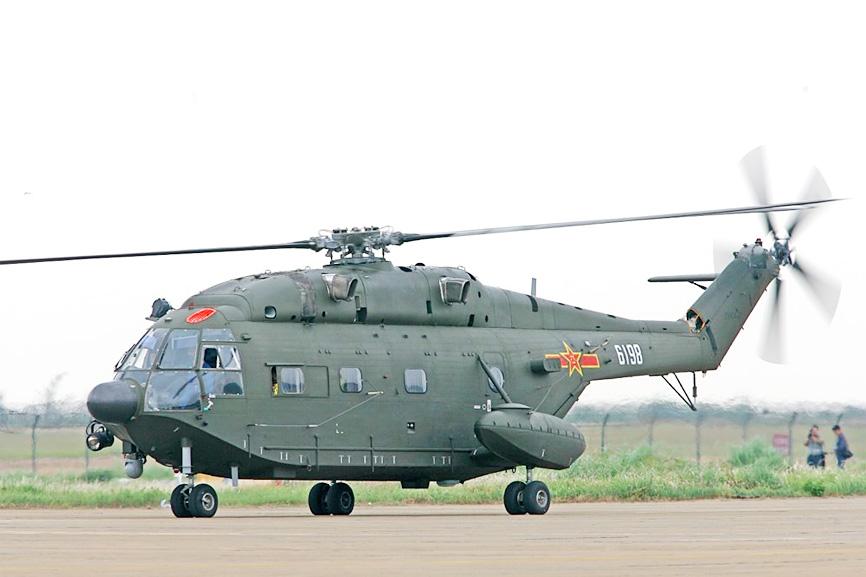The first-ever incursion of Chinese military helicopters into Taiwan’s southwestern air defense identification zone (ADIZ) this week suggests that the Chinese People’s Liberation Army (PLA) could be rotating through its arsenal of aircraft to probe the capabilities of the Taiwanese defense system and how it responds, experts said on Friday.
The Ministry of National Defense said that two Z-8 helicopters — the Chinese version of the French Aerospatiale SA 321 Super Frelon — and one Shaanxi Y-8 transport plane flew into the southwest ADIZ on Friday morning.
The ministry on Thursday said that a Harbin Z-9 “Haitun” helicopter and a Y-8 transport plane also flew into the ADIZ south of the Taiwan Strait, adding that it was the first recorded incident of Chinese helicopters since the ministry began reporting Chinese aerial incursions in September last year.

Photo courtesy of the Ministry of National Defense
Lu Li-shih (呂禮詩), a former instructor at the China Naval Academy in Kaohsiung, said that the Z-8 and Z-9 helicopters vary in their features, but have similar their radar cross-sections.
These are the two main types of helicopters that Taiwan’s military would most likely come across, Lu said.
By deploying one of the helicopter versions and observing how Taiwan reacts, Beijing can gather intelligence on Taiwan’s response procedures and how well the military knows Chinese helicopter types, he said.
Institute for National Defense and Security Research analyst Shu Hsiao-huang (舒孝煌) said the Z-8 is one of the mid-sized to large helicopters fielded by the PLA and has anti-submarine, airborne early warning and troop transport capabilities.
Any form of surprise landing in Taiwan would likely employ a Z-8, Shu said, adding that these helicopters can take off from large ships or newly created airfields along China’s southeastern coast.
Lu said that China could deploy more helicopter types to test Taiwan’s responses and to fatigue military pilots, adding that Beijing could also begin sending drones.
The military should deliver a complete countermeasure against Chinese harassment, Lu said.

Taiwan has received more than US$70 million in royalties as of the end of last year from developing the F-16V jet as countries worldwide purchase or upgrade to this popular model, government and military officials said on Saturday. Taiwan funded the development of the F-16V jet and ended up the sole investor as other countries withdrew from the program. Now the F-16V is increasingly popular and countries must pay Taiwan a percentage in royalties when they purchase new F-16V aircraft or upgrade older F-16 models. The next five years are expected to be the peak for these royalties, with Taiwan potentially earning

STAY IN YOUR LANE: As the US and Israel attack Iran, the ministry has warned China not to overstep by including Taiwanese citizens in its evacuation orders The Ministry of Foreign Affairs (MOFA) yesterday rebuked a statement by China’s embassy in Israel that it would evacuate Taiwanese holders of Chinese travel documents from Israel amid the latter’s escalating conflict with Iran. Tensions have risen across the Middle East in the wake of US and Israeli airstrikes on Iran beginning Saturday. China subsequently issued an evacuation notice for its citizens. In a news release, the Chinese embassy in Israel said holders of “Taiwan compatriot permits (台胞證)” issued to Taiwanese nationals by Chinese authorities for travel to China — could register for evacuation to Egypt. In Taipei, the ministry yesterday said Taiwan

‘LIKE-MINDED PARTNER’: Tako van Popta said it would be inappropriate to delay signing the deal with Taiwan because of China, adding he would promote the issue Canadian senators have stressed Taiwan’s importance for international trade and expressed enthusiasm for ensuring the Taiwan-Canada trade cooperation framework agreement is implemented this year. Representative to Canada Harry Tseng (曾厚仁) in an interview with the Central News Agency (CNA) said he was increasingly uneasy about Ottawa’s delays in signing the agreement, especially as Ottawa has warmed toward Beijing. There are “no negotiations left. Not only [is it] initialed, we have three versions of the text ready: English, French and Mandarin,” Tseng said. “That tells you how close we are to the final signature.” Tseng said that he hoped Canadian Prime Minister Mark Carney

POSITIVE DEVELOPMENT: Japan and the US are expected to hold in-depth discussions on Taiwan-related issues during the meeting next month, Japanese sources said The holding of a Japan-US leaders’ meeting ahead of US President Donald Trump’s visit to China is positive news for Taiwan, former Japan-Taiwan Exchange Association representative Hiroyasu Izumi said yesterday. After the Liberal Democratic Party’s landslide victory in Japan’s House of Representatives election, Japanese Prime Minister Sanae Takaichi is scheduled to visit the US next month, where she is to meet with Trump ahead of the US president’s planned visit to China from March 31 to April 2 for a meeting with Chinese President Xi Jinping (習近平). Japan and the US are expected to hold in-depth discussions on Taiwan-related issues during the